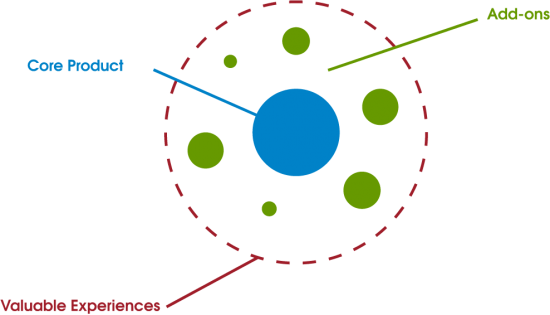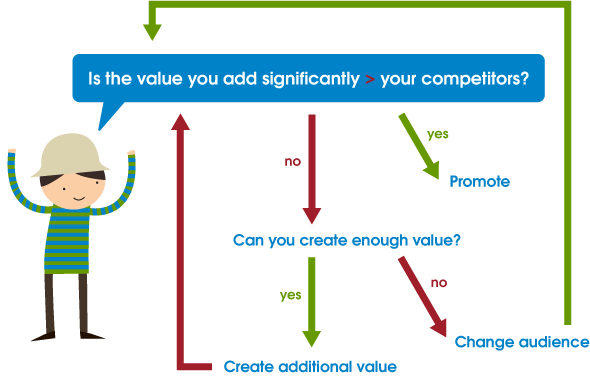The short version
Most will know that marketing has changed significantly over the past ten or so years but even many marketing experts struggle to put their finger on exactly what underpins what they do. My own soul searching has led me to sum up marketing today as being about “improving or extending an organisation’s offering to a point where their customers will do the marketing for them”.
Through seeing tech start-ups gain massive traction largely by just being amazing, I’ve come to realise that the entrepreneurial disciplines they are applying are also directly applicable to what we’ve been doing in the online marketing world. Finally I re-open the debate about what we should call modern marketing and make my case for “entrepreneurial marketing”.
The internet has changed marketing
An ever increasing number of marketers have accepted that marketing has dramatically changed forever. Whilst almost all see this as a shiny future, the journeys people have taken in reaching this conclusion are many and varied.
There are coders who embraced search engine optimisation back when it was possible to put a few words on a page and gain ranks. They’ve since grown and adapted as search engines have become more sophisticated. There are long term bulletin board enthusiasts who’ve morphed into social media enthusiasts and there are publishers and journalists who’ve found new powers in being able to escape print. There’s also the 20 something (or even younger) “digital natives” who can see that what they are being taught about marketing doesn’t fit with their own personal experiences and of course there are traditional marketers who’ve felt an earthquake.
My own journey started in 1998 when I was working for a start-up venture in a corporate environment, where I found myself dumped with something called a “website” to look after. This task tended to be given to people in IT so it was quite unusual for it to be given to someone working on the marketing side of things, but that’s what happens in start-ups; there are always more roles than people (even though the company numbered about 40 at the time). So I saw my role as not to make sure the site stayed up, but to use it as a tool to attract customers.
I set about teaching myself about search engines rankings and before I knew it I stumbled across an SEO tool that I realised could be adapted for a business idea I had put up on my pin board a year or two before. The urge to pursue the idea proved irresistible and every spare moment (and a good bit more) was spent reading anything I could about what made websites tick and how they should be marketed.
One last thing I did though before leaving the security of employment was to present a plan for taking my employer’s website to the next level. What I delivered is what many today would recognise as an inbound or content marketing plan. It included what was effectively a blog and in-depth content resources (white papers and the like), forum marketing and even a webcam (well it was 1998 and who didn’t want a webcam then?!).
Like many a good content plan, it never came to fruition. I moved on, senior management liked it but didn’t truly see the value and the business collapsed anyway.
I was lucky though because somehow I had stumbled on the key to success in the forms of marketing that are only now becoming mainstream. I instinctively realised that success was really all about doing things for the target audience. It was an instinct though, not something that I was fully conscious of or could easily articulate. This I have discovered, is not uncommon.
Returning to all those marketers embracing this “new” brand of marketing. They’ve all gained the “instinct” in their own way but still very few of them are actually able to articulate what really underpins what they do. They get “it”, but they can’t put their finger on it. Now I’m not talking about those people “doing social media because that’s what everybody else is doing”, I’m referring to the deep thinkers; the sort of people who inspire me and who I learn from everyday.
The Attacat Way
This really hit home for me about a year ago when, determined to improve our processes and procedures, I set about working with the Attacat team to get down on paper how we do things. I presented a vision of all our clients having a comprehensive marketing plan that would drive how we would progress their business and we then sat down to create the blueprint of that plan. This became known internally as “The Attacat Way”.
In my presentation was a slide that said:
But what is it then? We set about defining what it is with great gusto and around a 150 post-it notes later we came up with something that if you simplified it would look a little like this:
I was frustrated, massively frustrated. Instinctively I knew this wasn’t right but could I articulate what wasn’t right? Could I hell. So I had a frustrated team, effectively paralysed. We couldn’t make any progress until I could articulate what wasn’t right and the phrase “Attacat Way” was an instant route to despair for the whole company.
And so continued my soul search. And after a while…
…Out popped “Entrepreneurial Marketing”
There have been many light bulb moments in the last 12 months, some brighter and longer lasting than others. The one that is still on is the one that says “actually, it’s not really marketing we are doing at all, instead we are making our clients remarkable through improving or extending their offering so their customers actually do the marketing for them.”

Assuming you buy that, it then follows that if we are striving to offer “remarkable things” then we need to think and act with an entrepreneurial mindset (whether the business we are working for is entrepreneurial or not). If you want your customers to talk about you, you need to provide them with something that doesn’t already exist – which is exactly what entrepreneurs do.
This view has been cemented by my exposure to the tech entrepreneur community in Edinburgh in particular and through gaining insights into how they work. I’ve seen how these companies are gaining massive visitor numbers, not through advertising but almost entirely through creating things that people want. They are laser focused not on gaining visitors but on working out how to create something that visitors actually want. It’s only after they’ve discovered what visitors want that they scale, but even then they do it in a way that sees their growth constrained only by the inherent attractiveness of their offering, not by their ability to bang a drum.
And if you think about it, much of what we are doing when we are “internet marketing” is creating things visitors want:
- a blog that provides a service in the form of regular commentary on topic X
- an infographic that’s of interest to a target market
- a piece of software that’ll help our prospects get a job done, which we offer for free in return for some good will
- a twitter stream that might routinely entertain
- a white paper that solves a customer problem
And so the list could go on. In each case, applying these relatively new and increasingly popular scholarly theories of entrepreneurship, such as that espoused by Eric Ries in “The Lean Start-Up” or Bill Aulet’s “Disciplined Entrepreneurship”, to the process of creating these resources for our target market will decrease the inherent risk in seeking to create things that don’t exist currently.
All these things also work better, as people are discovering, if they are part of a coherent vision (ever spent an hour with an entrepreneur and not heard the word “vision”? A cola bottle says you haven’t). If we, as marketers, see all the “content” and “things” we create as part of the overall offering a company gives its customers and prospects rather than seeing them as things that make us feel like we are doing modern marketing, then I feel success is much more likely. In short your marketing should be part of the vision for the company, not something that’s tacked on afterwards.
Where do things like SEO fit into all this?
Well SEO is an outcome of creating things people want, not a strategy or tactic in it’s own right. Likewise social media: the large amount of failure in social media is down to the fact that marketers aren’t actually offering what people want. That’s a shock to those who’ve been used to using large budgets to give the impression that a consumer has no other option. Conversion Rate Optimisation? Well bless it, it’s all about discovering what people want. PPC? It’s a bit of a halfway house between “old” and “new” but there is still a discount for those who offer what customers want. Display Advertising? That only works if you offer what someone wants in the first place. The same is pretty much also true of Public Relations. (If you want to learn more about these concepts then dive into our free online marketing training)
So the soul search for the Attacat Way has led to this: we improve or extend our customers offerings. And the phrase we attach to this is “Entrepreneurial Marketing”.
What another new bloody buzzword? You’re joking right?
Sorry I’m not, I just don’t like the other phrases that are out there, even if I buy into the vast majority of what their proponents offer. Take the following for example:
But what’s wrong with “Internet Marketing”?
This is the phrase Attacat has historically pinned itself to as the majority of what we do is online. My soul search however has made me realise that the mindset we’ve been applying is also relevant to much of the offline marketing world. Running a physical event for example adds to a company’s offering.
“Content marketing”?
All the rage I know, but I can’t get away from the fact that when you say “content marketing” people start thinking about blog posts and infographics. I know you can stretch the definition of content to cover all sorts like software, training courses etc but its a hard one.
“Permission marketing”?
This is a phrase that’s never gained the traction it deserves in my opinion. I find the insights of Seth Godin (the man behind the phrase) utterly impressive but maybe because permission is only a part of his overall philosophy it’s never taken off.
“Inbound marketing”?
There is no doubt that this phrase has gained traction and if I’m going to go on a crusade to bring “Entrepreneurial Marketing” into the common lexicon, this is the Usain Bolt of marketing phrases. It’s going to be difficult to overtake.
I love the implied idea of getting people to come to you rather than going to them (the magnet instead of the megaphone).
So why don’t I like it? In part because too many people have associated it with 6 tweets a day and a blog post a week type of tactics or as I said at the beginning “Website + SEO + PPC + CRO + Social Media”. I’ve got nothing against tweeting and blogging, quite the contrary. I just find it soul destroying when there isn’t an underlying strategy.
I know the best “inbound marketer” will instinctively do it with a strategy but as a movement I feel it misses out by not seeking to challenge the fact that what many companies are trying to market is just something that people don’t actually want. Entrepreneurial marketing on the other hand asks that question before doing anything else.
“Growth hacking”?
Isn’t this just one of those phrases like “link baiting” that shouldn’t be used in front of people who are new to it all?
“Growth” – that’s great, love it. It’s instinctively entrepreneurial. “Hacking” though? To me it implies short-cuts, cheats or pursuing an agenda regardless of how the rest of society may see it. The best growth hackers are totally above board legitimate marketers continually looking for better ways to get things done and are true experts at this thing that we are trying to name. However I’ve seen people calling themselves growth hackers touting tactics on respected publications which in my mind equate to spam or in some cases illegal, deceptive or interruptive tactics.
“Modern Marketing”?
This is another phrase I find really easy to use as it shouts “things have changed, get with the program”. The problem with “modern” though is what comes next. I’ve always thought “post-modern” a bit of a fudge, making up for someone else’s bad decision.
“Entrepreneurial Marketing”!
To me it brings together all that is good about the above phrases. “Content” is one way of delivering an offering or adding to it. By focusing on making something people want, you work to get their “permission” and get them to come to you (aka “inbound”). Entrepreneurship implies “growth” and why else would you want to market for reasons other than growth?
The word conjures up visions of, well…visions, and seeking out opportunities to fill gaps in markets or even making the World a better place through innovation and solving of previously unsolved problems. More importantly it helps to visualise fulfilling a need that people never knew they had.
It also allows, in my mind anyway, the marketer to address the elephant in the room: there are many products and services that simply won’t respond to slapping on some SEO, social media etc because actually there are many other better offerings out there. It implies marketing going to the heart of the business and seeing changing a business as part of the marketing process.
The E word also gives us permission to embrace the still relatively new entrepreneurial branch of business science and apply it to marketing. I personally find that an exciting prospect.
Does it actually matter?
Arguably we could just say “Hey I’ve invented this new thing. Have you heard? It’s called Marketing”. But that would be arrogant. Whether it’s inbound, permission, content or entrepreneurial marketing that you pin your colours to, to define any one of them as just being “marketing” suggests that the philosophy is all encompassing and leaves no room for any other – none of these four cover everything in marketing. I’m confident enough to believe that what I understand as entrepreneurial marketing can be centre stage in the theatre that is marketing, but I’m certainly not arrogant enough to think that a company should indulge in nothing other than entrepreneurial marketing.
So yes, to me it does matter. I believe a name is important as it can imply a mindset, a guiding principle. By putting “entrepreneurial” at the heart of the marketing we continually look to entrepreneurship skills for inspiration. We continually ask questions about how we can do things for customers and prospects that aren’t being done currently or could be being done better. We start with a vision and then look for appropriate tactics. We seek to improve the lives of customers and prospects and generally set out to add value to all those who are exposed to the marketing activities we undertake. Even if it raises the question “why do you call it entrepreneurial marketing?” it begins the type of conversation I feel needs to be had.
Do you like the phrase?
I’ve witnessed plenty of debates in the past around what we should call “it” and they tend to incite ridicule and boredom in equal measure. But I’m interested to hear your thoughts. Does it do anything for you? Have you heard it or even used it before? Am I jumping to the wrong conclusions about the direction of marketing? Are there any negative connotations of the phrase?


